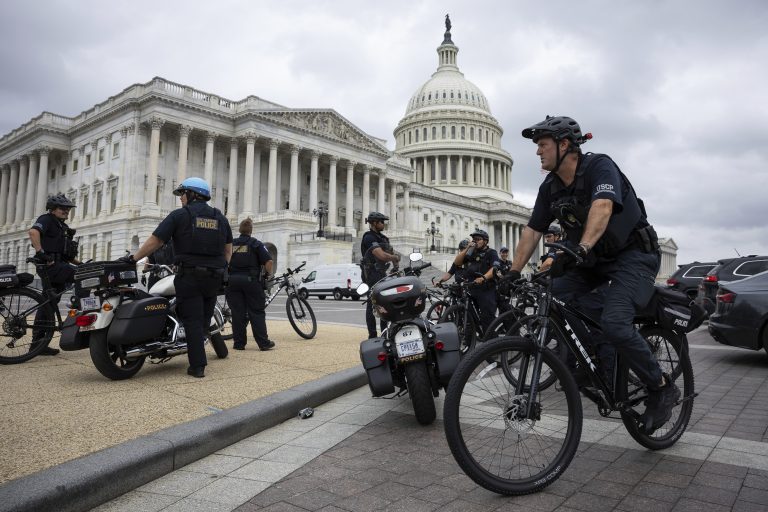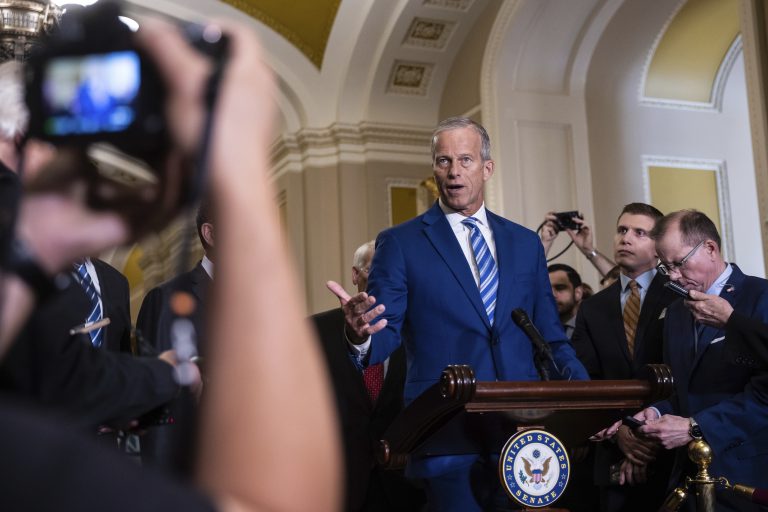Congressional lawmakers are once again grappling with the reality of persistent and escalating political violence — and facing a dilemma about whether to pour more tax dollars into their own protection.
On the Capitol grounds, they’re surrounded by layers of security and a police force that was dramatically overhauled after the riots of Jan. 6, 2021. But back home in their districts, members of the House and Senate are feeling increasingly exposed following the shootings in Minnesota that killed a state representative and her husband; wounded a state senator and his wife; and revealed a list of other elected officials who might have been harmed had the suspect not first been apprehended.
It all has predictably rattled both Democrats and Republicans in Washington, many of whom responded by making new demands for more money and resources for security.
A bipartisan Senate duo of Adam Schiff (D-Calif.) and Dave McCormick (R-Pa.) made the case for additional lawmaker security funding at a Tuesday morning briefing with the Senate Sergeant-at-Arms and U.S. Capitol Police, according to Senate Minority Leader Chuck Schumer.
Across the Capitol, House Democrats held a briefing Tuesday afternoon to hear from law enforcement officials and get walked through available resources, according to three people familiar with the discussion. And Republican Rep. Tim Burchett of Tennessee sent a letter to the House Administration Committee calling for an expansion of what House members are allowed to spend on security expenses, including on “around the clock” security personnel instead of only during “official conduct and representational duties” — restrictions he called “inadequate.”
Recent events have also prompted fresh questions about what can be done and how much money is actually necessary to alleviate the risks that come with being a public figure. The answer is enormously complicated.
Ultimately, lawmakers are divided over welcoming — and paying for — the kinds of additional safety precautions that would inevitably restrict their freedom of movement, limit their interactions with regular people and intrude on their family life. Unlike the senior most leaders who have 24/7 security details, rank-and-file members are typically left to their own devices unless they are deemed to be under active threat by Capitol Police.
“I feel like the law enforcement — they’re doing their best to protect us. I try to make good, common-sense decisions,” Sen. Lindsey Graham (R-S.C.) said after his chamber’s Tuesday morning security briefing. “But you just can’t get locked down. You just got to press on.”
“I don’t want to have security on me. I’m a very private person. I like to go outside and be by myself,” added Sen. Markwayne Mullin (R-Okla.), who chairs the Senate appropriations subcommittee that funds Capitol Police.
Consider two programs the House and Senate Sergeants-at-Arms and the Capitol Police have spent years trying to promote to members: one for security updates at lawmakers’ primary residences and another to coordinate local and Capitol Police resources for in-district events.
So far, Capitol Police have mutual aid agreements with more than 100 state and local police departments around the country to do this type of work, according to former chief Thomas Manger, who departed last month. But that’s still just a fraction of what would be needed for every member to have access to seamless security coverage in their home state or district, with local departments reimbursed by the agency.
More than half of all House lawmakers last year took advantage of the home security program, but those who didn’t enroll cited either a lack of interest or a feeling that the paperwork and approval process were too burdensome, according to two people familiar with the administration of the initiative, granted anonymity to speak candidly about it. That left hundreds of thousands of dollars in the House Sergeants-at-Arms budget unspent.
The extent to which recent events might be changing lawmakers’ thinking will be tested next week, when the House Legislative Branch appropriations subcommittee is scheduled to meet to consider its bill to fund the operations of Capitol Hill. In a spending cycle where Republicans in both chambers are looking for deep cuts, lawmakers will have to decide if their own security is worthy of further investment — and what that security might look like.
Manger, in his final budget proposal to House and Senate appropriators, asked for an allocation of $967.8 million for fiscal 2026, a 22 percent boost over the current funding level which was set in fiscal 2024. The Capitol Police budget has already increased more than 70 percent since Jan. 6. And with some lawmakers calling this week for even more resources for member security, the budget for the relatively small force could top $1 billion for the first time this year or next.
Top House Democrats, for instance, have asked Speaker Mike Johnson to boost funding for security through what’s known as the Member Representation Allowance, which each House member receives to fund basic office expenses including payroll. Increasing the MRA would allow lawmakers to increase security capabilities without taking away money that pays staff salaries.
Sen. Richard Blumenthal (D-Conn.) said he supports additional resources for member security but stressed that it must be implemented in a way that is “unobtrusive and non-interfering” with lawmakers’ work.
“I have no intention of changing the way I live or do my job, because accessibility is part of who I am as a public official,” Blumenthal continued. “But I understand how people are scared.”
Capitol Police have poured significant financial resources over the last four years into overhauling their intelligence operations and expanding the assessment teams that handle the growing threats against lawmakers. Blumenthal said he wants those capabilities further ramped up, saying right now serious threats are too often “discounted as a prank or a joke.”
Sen. Mike Rounds (R-S.D.) made a similar case, arguing there would be value in having more tools to identify individuals who are “going beyond the normal bickering that you find on social media, getting to the point where they appear to be more dangerous or making actual accusations or threats to individuals that they might at some point act on in the future.”
Reps. Bryan Steil (R-Wis.) and Joe Morelle (D-N.Y.), the chair and ranking member of the House Administration Committee, on Tuesday wrote to the Justice Department requesting that an assistant U.S. attorney or a special assistant U.S. attorney be assigned “to each of the 94 federal districts to, at least on a part-time basis, investigate and prosecute threats against Members of Congress.”
Some lawmakers also continue to push for increased security and Capitol Police protection at their homes in the aftermath of the attackon then-Speaker Nancy Pelosi’s husband at their San Francisco residence in Oct. 2022. Capitol Police have tried to build strong working relationships with local departments to counter threats, swatting attempts and problems at town halls or other events — hoping that local law enforcement can help fill the gaps in protection faced by members of Congress when they’re back home.
The force opened several satellite offices in the aftermath of the Jan. 6 riots, too, in part to respond to increased threats to lawmakers outside of Washington. The department reported more than 9,400 threats against members in 2024, and a good number of those were deemed credible enough to require temporary protective details for rank-and-file lawmakers who otherwise would not be entitled to them.
In a statement, a Capitol Police spokesperson said the force would keep doing its work: “We continue to closely coordinate with the House and Senate Sergeant at Arms to enhance security for Members of Congress. Their partnerships, along with assistance from local, state, and federal law enforcement agencies across the country, are extremely important to keep everyone safe.
“For safety and security reasons, we will not discuss those details,” the spokesperson said, “but we will continue to focus on continuing intelligence sharing with our partners and providing proactive enhancements.”
But Manger lamented in an interview days before his retirement that, “We’re always robbing Peter to pay Paul to put that together,” referring to the need to urgently assemble Capitol Police details for members under threat.
Mullin conceded that no matter what choices lawmakers make, worries of political violence will continue to be a way of life.
“I operate right now with a tremendous amount of death threats on us. I mean, if you go to my house, I have bulletproof glass on the bottom part of my house. … We have cameras everywhere. We have security dogs,” said Mullin. “It is, unfortunately, the reality we live in.”
Lisa Kashinsky contributed to this report.


